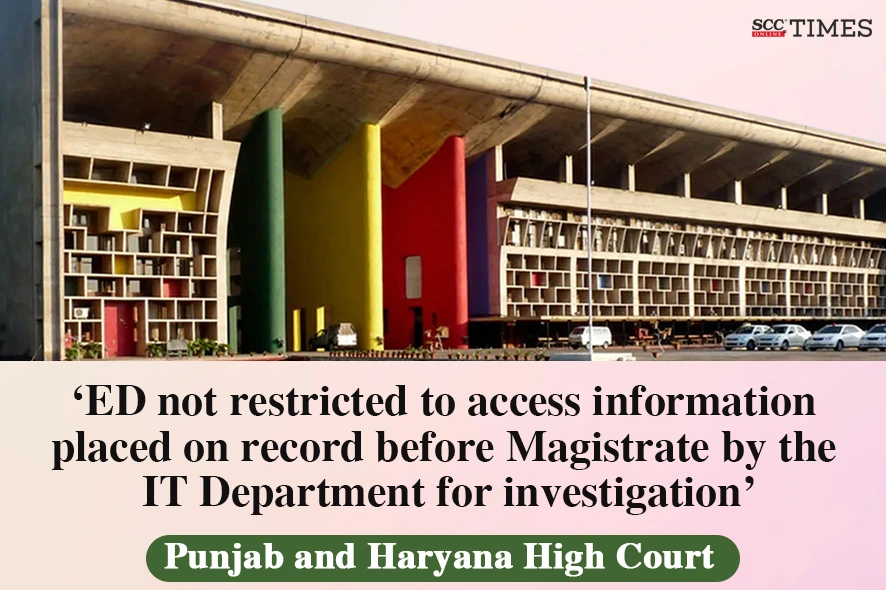Punjab and Haryana High Court: In three petitions filed under Section 482 Criminal Procedure Code, 1973 (‘CrPC’), the petitioners had sought for setting aside the order passed by Additional Sessions Judge dismissing the revision petition filed against the order passed by Judicial Magistrate 1st Class whereby the application filed by the Enforcement Directorate (‘ED’) to inspect the documents attached with the complaint filed by the Income Tax Department (‘IT Department’) had been allowed. A Single Judge Bench of Tribhuvan Dahiya J., while dismissing the petitions, held that there was no restriction on the ED to access the information or documents placed on record before the Magistrate by the IT Department for the purpose of investigation.
The Court permitted the ED to inspect the record of the complaints before the Magistrate and access the information/documents and prohibited its dissemination publicly.
Background
In the present case, the IT Department filed a complaint before the Chief Judicial Magistrate, Ludhiana, against the petitioner under Section 277 of the Income Tax Act, 1961(‘IT Act 1961’) read with Sections 176, 177, 181, 186, 187, 193 and 199 of the Penal Code, 1860 (‘IPC’) by placing on record the information in the form of master sheets originally received in Paris, France, by the competent authority of India/Foreign Tax and Tax Research Division of Central Board of Direct Taxes from the competent French authority to the effect that the petitioners were beneficiaries of foreign assets maintained and controlled through foreign business entities.
During pendency of proceedings before the Magistrate, the ED moved an application for inspection of the aforementioned information/documents on the ground that it was also seized of the subject matter of the complaint, and for the purpose of conducting investigation the documents were required to be examined. The application was allowed by the Magistrate and a revision petition against the same was dismissed by the Additional District Judge referring to Rule 2 of Part-C, Chapter 16 of the Punjab and Haryana High Court Rules and Orders, Volume 4.
The petitioners contended that grave prejudice had been caused to them as the ED was stranger to the complaints and the records contained secret information given by the French Republic to the Government of India and there was a specific bar on providing any such information to a stranger under the Agreement for Avoidance of Double Taxation with France.
Analysis and Decision
The Court referred to Article 28 of the Convention under the Agreement for Avoidance of Double Taxation with France and stated that there was a bar on disclosing any information received by the contracting State and it was to be treated as secret under the domestic law and it could only be disclosed to the persons or authorities involved in the assessment or collection of taxes or enforcement or prosecution thereof, etc. The Court opined that it remained undisputed that the information or documents placed on record before the Magistrate by the IT Department, were received by it in the French Republic at Paris, and its use as well as dissemination was regulated under the Agreement for Avoidance of Double Taxation.
Considering the facts of the case, the Court stated that the information regarding the foreign assets concerning the petitioners had been placed on record in the form of documents before the Magistrate by the I.T. Department which had been sought by ED, another government department, for the purpose of investigation and thus, it was not a case that the information was demanded for public dissemination; rather, it was only for carrying out investigation against the petitioners.
The Court held that there was no right to object to it by alluding to the Avoidance of Double Taxation Agreement, it was the Government of India which had entered into this Agreement with the French Republic, whereunder the information had been handed over to the IT Department and in case disclosure of information caused any violation of terms of the Agreement, including that of Article 28, it was for the Department to oppose it on that ground and not for the petitioners.
The Court stated that if a citizen or entity had any information of wrongdoing with respect to a Bank account, it must be shared with the State which is under obligation to investigate the same. Further, the Court opined that the information was sought by an organ of the State for the purpose of investigation which could not be taken exception to in view of the settled law.
Thus, the Court observed that there was no restriction on the ED accessing the information or documents placed on record before the Magistrate by the IT Department for the purpose of investigation and it could not be said that the ED was trying to procure the documents by circumventing the Agreement concerned.
Thus, the Court held that the order passed by the Additional Sessions Judge was well-reasoned and did not suffer from any infirmity or error of law and accordingly, dismissed the petition. The Court further permitted the ED to inspect the record of the complaints before the Magistrate and access the information and documents and prohibited its dissemination publicly unless permitted in accordance with law.
[Amarinder Singh v. IT Department, 2025 SCC OnLine P&H 6903, decided on 3-9-2025]
Advocates who appeared in this case:
For the Petitioners: Gurmohan Singh Bedi, Advocate, Amandeep S. Talwar, Advocate, Pawandeep Singh, Advocate, Anand V. Khanna, Advocate, and Ambika Bedi, Advocate
For the Respondents: Zoheb Hossain, Special Counsel, Lokesh Narang, Senior Panel Counsel and Vipul Joshi, Advocate




